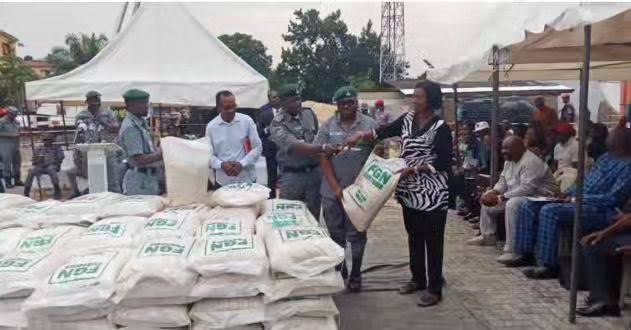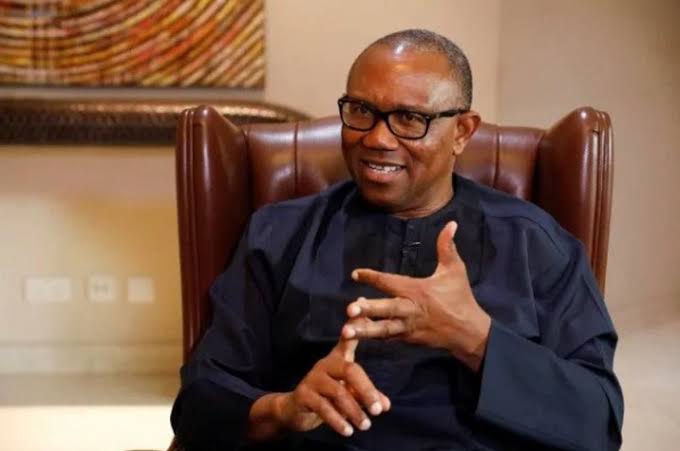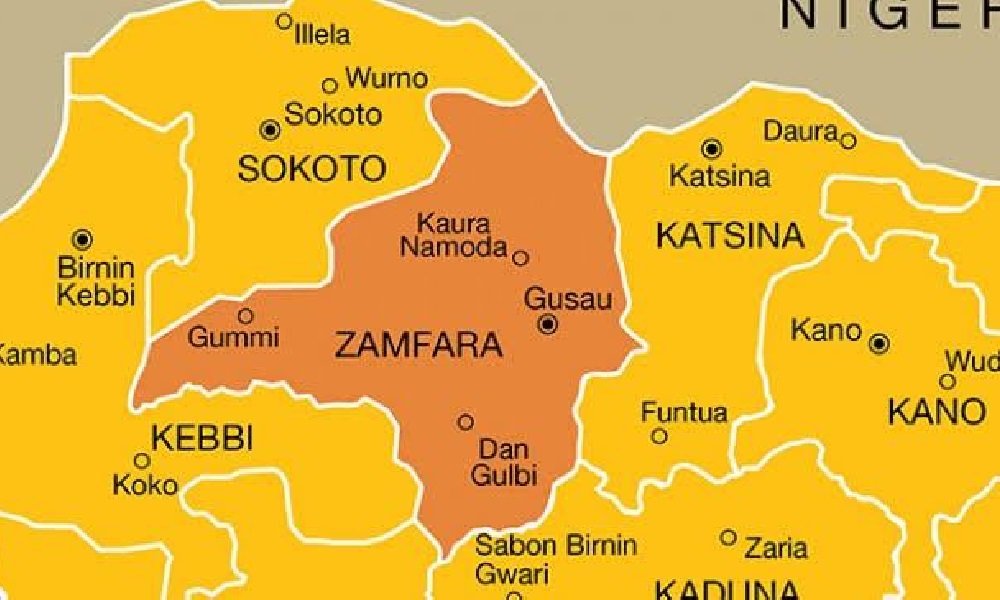News
GOOD NEWS! Customs Begins Sale Of Rice At N10000 Per 25kg

By Emmanuel Agaji
In fulfillment of the promise made a few days ago as aligning with the federal government’s avowed desire to mitigate the hardship presently being experienced by the general populace, the Nigeria Customs Service is today commencing the sale of seized, but verifiably determined healthy for consumption rice to the public.
The Comptroller General of Customs, Adewale Adeniyi, Thursday affirmed the determination of the government to alleviate the suffering of the people through calculated interventions and clear thought out policies as he spoke with press men at the Harvey road, Yaba Lagos, Zonal Headquarters of the Nigeria Customs Service.
He said “In recent months, the government has been addressing the challenges faced within our economy, particularly the lagged effects of insecurity and the current exchange rate issues. These challenges have exacerbated concerns about foods security leading to a concerning trend where food items are moving out massively to neighbouring countries. Some of the items include:
a. Over 20,000 bags of assorted grains (Rice, beans, Maize, Guinea corn, millet, Soya beans .
b. 2500 cartons and 963 bags of dried fish.
c. Others include, Dried pepper, tomatoes, cooking oil, Maggi (seasoning), Macaroni, salt, sugar and garri. This trend is not sustainable as it puts pressure on our productive capacity and threatens our food security”.
A cross section of journalists at the event.
He added “To address this, the NCS has remained responsive in carrying out its mandate to protect our borders from the inflow and outflow of restricted goods. One concerning trend noticed is the outflow of food items in huge quantities, posing a threat to our food security. It should be noted that the condition for the export of any item is only met upon fulfilling sufficiency internally. In this regard, food items deemed not to fulfil these conditions are showing up in our interceptions made at the borders”.
The CGC informed the audience that “As part of our ongoing commitment to safeguarding the food security of Nigerians, the NCS has secured approval from the government to dispose of these seized food items to needy Nigerians at discounted prices. The criteria for Nigerians to benefit from this initiative include having a verifiable National Identification Number (NIN). The target groups include artisans, teachers, nurses, religious bodies, and other Nigerians within our operational areas. The intention is to reach out directly to members through these organised structures to ensure the maximum impact of this exercise”.
CGC Adeniyi noted that “To ensure the security and integrity of this initiative, NCS has put in place comprehensive measures. These measures encompass robust security protocols throughout the process. Our officers will be closely monitoring the entire supply chain to prevent any misuse or diversion of the food items. Moreover, we have established strict guidelines and eligibility criteria to ensure that the items are distributed only to those in genuine need. Additionally, we will be working closely with relevant agencies to ensure compliance with the terms of this programme.
Demonstration if the sales.
His words “It is imperative that beneficiaries of this exercise understand that the items are not to be resold. We take a strong stance against any form of profiteering or exploitation of this initiative. We urge Nigerians to report any incident of misuse or unauthorised resale of the seized food items. NCS is fully committed to transparency and accountability in this process, and we will not hesitate to take decisive action against any individual or entity found to be in violation of the terms of this programme”.
He concluded that “the NCS is committed to fostering a culture of transparency, accountability, and public service by upholding the highest standard of integrity and ethical conduct, the NCS will continue to earn the trust and confidence of the Nigerian people. As a responsive and forward-thinking organisation, the NCS will remain at the forefront of efforts to drive sustainable development, enhance competitiveness and promote inclusive growth”.
Another demonstration of the sales processes.
At the question and answer session, the CGC said that the Service has really thought about potential loopholes before choosing to sell the 25kg bag of rice at Ten thousand Naira only and with a National Identification Number before being attended to.
On the probable ocurence of violence, the CGC answered that the sale is being coordinated in conjunction with many of the nation’s security apparatus to forestall any stampede or violence. He added that at the Harvey road, Yaba point alone, at least ten tables are going to be used to accredite buyers before purchase and noted that the National Agency For Food and Drugs Administration and Control (NAFDAC) has certified the rice fit for consumption.
Crucially, CGC Adeniyi said that your NIN can only buy one 25kg bag of rice in this particular round of sales and that the Customs cannot go through groups to sell the rice because of the apparent tendency for abuse, he chipped in that some groups have been reached to participate in this sale, but that when they come, they will get the rice individually. The sale starts on Friday, the 23rd of February 2023.
News
Obi doesn’t need political coalition to flush out Tinubu in 2027 – NLC declares

The Nigeria Labour Congress (NLC) has declared that Peter Obi, the Labour Party’s 2023 presidential candidate, can secure victory in the 2027 presidential election without forming alliances with the Peoples Democratic Party (PDP) or relying on figures like Atiku Abubakar or Nasir El-Rufai.
In an exclusive interview, Professor Theophilus Ndubuaku, Deputy President of the NLC Political Commission, described Obi as a credible, broadly accepted leader with deep grassroots and international support more than enough to unseat President Bola Tinubu, assuming a free and fair electoral process.
Ndubuaku dismissed speculation about Obi’s possible return to the PDP, labeling the party “crisis-ridden and practically empty.”
“Peter Obi is a sellable candidate. He doesn’t need any coalition to win in 2027,” Ndubuaku stated. “He was already in the lead during the 2023 elections, even clinching Lagos Tinubu’s stronghold which clearly demonstrates his nationwide appeal.”
He emphasized that transparent and credible elections by the Independent National Electoral Commission (INEC) would reveal the breadth of Obi’s support, which cuts across all six geopolitical zones.
His remarks follow the Obidients Movement’s recent reaffirmation of loyalty to Obi. National Coordinator Dr. Yunusa Tanko described Obi as the only candidate capable of bringing meaningful change to Nigeria.
Ndubuaku further criticized the PDP, arguing it no longer presents a viable platform for serious contenders. “The Labour Party has resolved its internal leadership disputes, unlike the PDP, which remains in disarray. Leaving LP for the PDP would be like jumping from the frying pan into the fire.”
He also downplayed zoning concerns, insisting Obi’s competence should take precedence over rotational politics.
“The North may worry he’ll seek two terms and upset zoning arrangements, but Obi is not power-hungry he is driven by a sincere commitment to national transformation,” he concluded.
News
Lawyer Arraigned For Alleged N7.25m Land Fraud

The police have arraigned a 33-year-old legal practitioner, Luka Linus Yabagi, at the Life Camp Chief Magistrates’ Court, Abuja, for allegedly cheating his client of N7.25 million.
The police charged Yabagi of Dakwa Abuja, who claimed to be a doctor of law, with cheating, criminal breach of trust, forgery and using as genuine documents.
The defendant pleaded not guilty to the charge levelled against him.
The prosecutor, Mrs Charity Nwachukwu, told the court that one Mr Mukhtar Isah of No.4 Goodluck Jonathan Street, Dakwa, Abuja, reported the matter at the Gwarinpa Police Station on Dec. 9, 2024.
Nwachukwu said that the defendant dishonestly and deceitfully made the complainant believe he had the capacity at FCDA to process and secure a land allocation for him.
She said that the defendant deceived the complainant into thinking he was going to use his application for the Statutory Right of Occupancy acknowledgement he secured with File No: 62024, in which he demanded payment.
She told the court that the defendant deceived the complainant into paying N7.25 million into his Access Bank account 1466739589, bearing Linus Befiyo Luka.
Nwachukwu said the defendant fraudulently and dishonestly gave the complainant an offer of statutory right of occupancy, a statutory right of occupancy bill, a site plan and a certificate of occupancy No. FCT/MZTP/LA/CUS/2047.
She said all the documents were bearing Paiamist Nig. Ltd as the allottee with plot No. 2233 located at Guzape II.
Nwachukwu told the court that the defendant deceitfully presented the forged document to the complainant and converted the N7.25 million he had spent on the land process and documentation to his personal use.
She also informed the court that the defendant absconded to an unknown destination, and all efforts to reach him proved abortive. However, he was later tracked and apprehended.
She said that during the police investigation, it was discovered that the purported document the defendant issued to the complainant was altered and forged and did not emanate from the Department of Land Administration.
The prosecutor told the court that the defendant could not give a satisfactory account of his actions.
Nwachukwu said that the case contravened the provisions of Sections 322, 312, 364 and 366 of the Penal Code.
The chief magistrate, Musa Jobbo, admitted the defendant to bail in the sum of N1 million and two sureties in like sum.
Jobbo ordered that the sureties must produce a reliable means of identification before the court registry.
He said that one of the sureties must be a property owner and must reside within the court’s jurisdiction.
Jobbo ordered the defendant to deposit N2 million in the FCT High Court Registry and adjourned the matter until June 19 for a hearing.
News
Zamfara Imam, three children killed after N11m ransom

Fresh waves of violence continued to sweep across parts of Nigeria on Tuesday, with reports of brutal killings in Zamfara and Benue states.
In Zamfara, bandits killed the Chief Imam of the Maru Jumu’at Mosque, Alkali Salihu Suleiman, along with his three children—despite receiving N11m of the N20m ransom they had demanded.
The tragic incident, which occurred two months after their abduction, has plunged the Maru community into mourning.
The late Imam and his children were abducted from Maru, the headquarters of Maru Local Government Area—a community long plagued by persistent bandit attacks.
A resident, Shehu Mani, told The PUNCH that the family had struggled to raise the ransom, managing to gather only N11m.
“After collecting the money, the bandits still held onto their victims,” Mani said. “Later, they demanded a new motorcycle and food items in place of the outstanding N9m. Even that could not be provided. Today, we received word from another abductee who escaped that the Imam and his children have been killed.”
While the victims’ remains had not yet been recovered, funeral prayers were already being planned in accordance with Islamic customs.
Efforts to reach the spokesperson for the Zamfara State Police Command, Yazid Abubakar, were unsuccessful as he did not respond to calls at the time of filing this report.
In a similarly disturbing development, suspected armed invaders beheaded a farmer, Felix Suega Ukir, in Tse Orkpe village, Nanev, within the Mbawa Council Ward of Guma Local Government Area in Benue State.
The community, which had previously been displaced by armed herders, is once again living in fear.
A local resident, speaking anonymously, confirmed the gruesome murder occurred on Monday.
“We found the body, but his head was missing. People are abandoning their farms again,” he said.
Former Security Adviser of Guma LGA, Christopher Waku, confirmed the incident to The PUNCH via telephone, but police spokesperson Catherine Anene stated that the command had not yet received a formal report.
As insecurity escalates across Nigeria’s North-West and North-Central regions—with renewed Boko Haram activity in the North-East and the emergence of a new terror group, Mahmdua, in Kwara and Niger States—Kwara State Governor AbdulRahman AbdulRazaq has begun ramping up local security measures.
On Tuesday, the governor met with first-class traditional rulers to strengthen grassroots security and prevent further cross-border incursions, particularly from areas like Kainji National Park, where military operations have intensified.
“We’re adopting a multi-agency approach to enhance development and protect lives,” the governor said in a statement issued by his Chief Press Secretary, Rafiu Ajakaye. “We urge royal fathers to rally their communities and assist security agencies with credible intelligence.”
The Vice Chairman of the State Council of Chiefs and Etsu Patigi, Alhaji Ibrahim Umar Bologi, commended the governor’s efforts.
“We will always support your administration. You’re doing a commendable job,” he said.
-

 News20 hours ago
News20 hours agoJust in: Popular Nigerian billionaire, E-Money nabbed by EFCC
-

 News20 hours ago
News20 hours agoKing Sunny Ade’s family opens up over his whereabouts after daughter’s alarm
-

 Politics16 hours ago
Politics16 hours agoJust in: Ex- Gov Okowa accepts betraying Southern Nigeria, laments running with Atiku
-

 News21 hours ago
News21 hours agoEx-DIG,Olofu debunks online newspaper report, says ” I retired from NPF meritously after 35yrs service
-

 News16 hours ago
News16 hours agoBoko Haram Kill Mourners, Kidnap Others In Borno
-

 News4 hours ago
News4 hours agoJust in: FG declares tomorrow public holiday
-

 News16 hours ago
News16 hours agoDeputy Speaker Leads Defection of PDP Stalwart Chris Igwe, 13,000 Followers to APC In Abia
-

 Metro4 hours ago
Metro4 hours agoGunmen storm University of Benin teaching hospital, kill doctor





